Bestofluck1
On this page, you find all documents, package deals, and flashcards offered by seller BESTOFLUCK1.
- 1811
- 0
- 101
Community
- Followers
- Following
12 Reviews received
1913 items
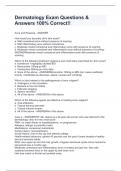
Dermatology Exam Questions & Answers 100% Correct!!
Acne and Rosacea - ANSWER How would you describe Jim's skin exam? a. Mild comedonal acne without presence of scarring b. Mild inflammatory acne without comedones c. Moderate mixed comedonal and inflammatory acne with presence of scarring d. Moderate mixed comedonal and inflammatory acne without presence of scarring - ANSWERModerate mixed comedonal and inflammatory acne with presence of scarring Which of the following treatment regimens was most likely prescribed for Jim's acne? a. I...
- Package deal
- Exam (elaborations)
- • 23 pages •
Acne and Rosacea - ANSWER How would you describe Jim's skin exam? a. Mild comedonal acne without presence of scarring b. Mild inflammatory acne without comedones c. Moderate mixed comedonal and inflammatory acne with presence of scarring d. Moderate mixed comedonal and inflammatory acne without presence of scarring - ANSWERModerate mixed comedonal and inflammatory acne with presence of scarring Which of the following treatment regimens was most likely prescribed for Jim's acne? a. I...
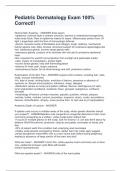
Pediatric Dermatology Exam 100% Correct!!
Normal Skin Anatomy - ANSWER-three layers -epidermis: outmost layer is stratum corneum, barriers to irritants/toxins/organisms, holds body fluids. Rest of epidermis makes thi slayer. Melanocytes protect from UV light, Langerhans cells first line of immunologic defense -dermis: consists mostly of fibroblasts and collagen; tough, leathery, mechanical barrier against cuts, bites, bruises; structural support for cutaneous appendages like hair, sebaceous glands, eccrine sweat glands nails -sebaceo...
- Package deal
- Exam (elaborations)
- • 27 pages •
Normal Skin Anatomy - ANSWER-three layers -epidermis: outmost layer is stratum corneum, barriers to irritants/toxins/organisms, holds body fluids. Rest of epidermis makes thi slayer. Melanocytes protect from UV light, Langerhans cells first line of immunologic defense -dermis: consists mostly of fibroblasts and collagen; tough, leathery, mechanical barrier against cuts, bites, bruises; structural support for cutaneous appendages like hair, sebaceous glands, eccrine sweat glands nails -sebaceo...
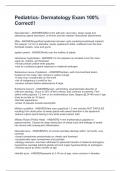
Pediatrics- Dermatology Exam 100% Correct!!
Neonatal skin - ANSWERdeffers from adlt skin- less hairy, fewer sweat and sebaceous gland secretions, is thinner and has weaker intracellular attachments Milia - ANSWERsuperficial epidermal inclusion cysts containig keratinized material firm papule 1-2 mm in diameter, pearly opalescent white, scattered over the face, forehead cheeks, nose and gums epstein pearls - ANSWERmilia over the midline of palate sebaceous hyperplasia - ANSWER1-2 mm papules usu located ovcer the nose, upper lip, c...
- Package deal
- Exam (elaborations)
- • 12 pages •
Neonatal skin - ANSWERdeffers from adlt skin- less hairy, fewer sweat and sebaceous gland secretions, is thinner and has weaker intracellular attachments Milia - ANSWERsuperficial epidermal inclusion cysts containig keratinized material firm papule 1-2 mm in diameter, pearly opalescent white, scattered over the face, forehead cheeks, nose and gums epstein pearls - ANSWERmilia over the midline of palate sebaceous hyperplasia - ANSWER1-2 mm papules usu located ovcer the nose, upper lip, c...
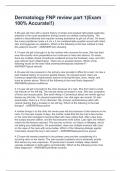
Dermatology FNP review part 1(Exam 100% Accurate!!)
A 69-year-old man with a recent history of stroke and residual right-sided weakness presents to the nurse practitioner during rounds at a skilled nursing facility. The patient is deconditioned and requires nursing assistance to get out of bed. On exam, the nurse practitioner notes a 4 cm x 3 cm nonblanchable purplish wound with intact skin and bogginess on palpation. Which of the following is the best method to treat this patient's wound? - ANSWERFoam dressing A 14-year-old girl is brought i...
- Package deal
- Exam (elaborations)
- • 17 pages •
A 69-year-old man with a recent history of stroke and residual right-sided weakness presents to the nurse practitioner during rounds at a skilled nursing facility. The patient is deconditioned and requires nursing assistance to get out of bed. On exam, the nurse practitioner notes a 4 cm x 3 cm nonblanchable purplish wound with intact skin and bogginess on palpation. Which of the following is the best method to treat this patient's wound? - ANSWERFoam dressing A 14-year-old girl is brought i...
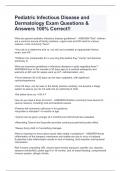
Pediatric Infectious Disease and Dermatology Exam Questions & Answers 100% Correct!!
What are general pediatric infectious disease guidelines? - ANSWER•"Sick" children are a common source of family medicine, urgent care and ER visits for various reasons, most commonly "fever". •Your job is to determine sick vs. not sick and complete an appropriate history, exam, and A/P. *Children can compensate for a very long time before they "crump" and become extremely ill. What are important guidelines in infectious diseases in peds regarding fever? - ANSWER•Fever in th...
- Package deal
- Exam (elaborations)
- • 15 pages •
What are general pediatric infectious disease guidelines? - ANSWER•"Sick" children are a common source of family medicine, urgent care and ER visits for various reasons, most commonly "fever". •Your job is to determine sick vs. not sick and complete an appropriate history, exam, and A/P. *Children can compensate for a very long time before they "crump" and become extremely ill. What are important guidelines in infectious diseases in peds regarding fever? - ANSWER•Fever in th...
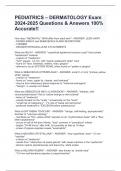
PEDIATRICS – DERMATOLOGY Exam 2024-2025 Questions & Answers 100% Accurate!!
How does *NEONATAL* SKIN differ from adult skin? - ANSWER- LESS HAIRY - FEWER SWEAT and SEBACEOUS GLAND SECRETIONS - THINNER - WEAKER INTRACELLULAR ATTACHMENTS What are MILIA? - ANSWER- *superficial epidermal inclusion cysts* that contain *keratinized* material - a lesion of *newborns* - *firm* papule, 1-2 mm, with *pearly opalescent white* color - found on *face, forehead, cheeks, nose, gingiva* - referred to as an EPSTEIN PEARL when found on *palate or gingiva* What is SEBACEOUS H...
- Package deal
- Exam (elaborations)
- • 10 pages •
How does *NEONATAL* SKIN differ from adult skin? - ANSWER- LESS HAIRY - FEWER SWEAT and SEBACEOUS GLAND SECRETIONS - THINNER - WEAKER INTRACELLULAR ATTACHMENTS What are MILIA? - ANSWER- *superficial epidermal inclusion cysts* that contain *keratinized* material - a lesion of *newborns* - *firm* papule, 1-2 mm, with *pearly opalescent white* color - found on *face, forehead, cheeks, nose, gingiva* - referred to as an EPSTEIN PEARL when found on *palate or gingiva* What is SEBACEOUS H...
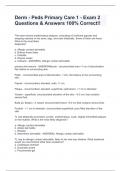
Derm - Peds Primary Care 1 - Exam 2 Questions & Answers 100% Correct!!
The exam shows erythematous plaques, consisting of confluent papules and weeping vesicles on his arms, legs, and neck bilaterally. Some of them are linear. What is the most likely diagnosis? a. Allergic contact dermatitis b. Bullous insect bites c. Cellulitis d. Herpes zoster e. Urticaria - ANSWERa. Allergic contact dermatitis primary skin lesions - ANSWERMacule - circumscribed area <1 cm of discoloration flat relative to surrounding skin. Patch - circumscribed area of discolor...
- Package deal
- Exam (elaborations)
- • 21 pages •
The exam shows erythematous plaques, consisting of confluent papules and weeping vesicles on his arms, legs, and neck bilaterally. Some of them are linear. What is the most likely diagnosis? a. Allergic contact dermatitis b. Bullous insect bites c. Cellulitis d. Herpes zoster e. Urticaria - ANSWERa. Allergic contact dermatitis primary skin lesions - ANSWERMacule - circumscribed area <1 cm of discoloration flat relative to surrounding skin. Patch - circumscribed area of discolor...
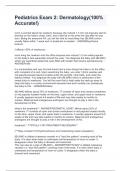
Pediatrics Exam 2: Dermatology(100% Accurate!)
mom is worried about her newborn because she noticed 1-3 mm red macules start to develop on her baby's chest, back, and a little bit on his arms the day after he was born. Being the awesome PA, you tell her that he most likely has (BLANK) which usually fades within 1 week and no treatment is needed. - ANSWERerythema toxicum (*affects >50% of newborns) mom bring her newborn into the office because she noticed 1-2 mm white papules on the baby's face especially around the nose. You diag...
- Package deal
- Exam (elaborations)
- • 17 pages •
mom is worried about her newborn because she noticed 1-3 mm red macules start to develop on her baby's chest, back, and a little bit on his arms the day after he was born. Being the awesome PA, you tell her that he most likely has (BLANK) which usually fades within 1 week and no treatment is needed. - ANSWERerythema toxicum (*affects >50% of newborns) mom bring her newborn into the office because she noticed 1-2 mm white papules on the baby's face especially around the nose. You diag...
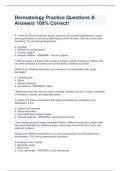
Dermatology Practice Questions & Answers 100% Correct!
A 7-year-old African American female presents with several hyperkeratotic raised, periungual lesions on the two middle fingers of her left hand. She has a history of nail biting. The most likely diagnosis is: a. Impetigo b. Molluscum contagiousum c. Verruca vulgaris d. Herpetic whitlow - ANSWERc. Verruca vulgaris *Common warts are found most usually on fingers, hands, and feet in children and are often preceded by trauma such as nail biting or picking at cuticles Which of the followi...
- Package deal
- Exam (elaborations)
- • 20 pages •
A 7-year-old African American female presents with several hyperkeratotic raised, periungual lesions on the two middle fingers of her left hand. She has a history of nail biting. The most likely diagnosis is: a. Impetigo b. Molluscum contagiousum c. Verruca vulgaris d. Herpetic whitlow - ANSWERc. Verruca vulgaris *Common warts are found most usually on fingers, hands, and feet in children and are often preceded by trauma such as nail biting or picking at cuticles Which of the followi...
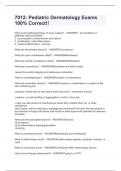
7012: Pediatric Dermatology Exams 100% Correct!!
What is the pathophysiology of acne vulgaris? - ANSWER1. accumulation of epithelial cells and keratin 2. accumulation of shed keratin and sebum 3. proliferation, mild inflammation 4. marked inflammation, scarring What are the primary lesions? - ANSWERComedones What are open comedones called? - ANSWERBlackheads What are closed comedones called? - ANSWERWhiteheads What are comedones? - ANSWERBlackheads and white heads caused by keratin plugging and sebaceous production What is...
- Package deal
- Exam (elaborations)
- • 11 pages •
What is the pathophysiology of acne vulgaris? - ANSWER1. accumulation of epithelial cells and keratin 2. accumulation of shed keratin and sebum 3. proliferation, mild inflammation 4. marked inflammation, scarring What are the primary lesions? - ANSWERComedones What are open comedones called? - ANSWERBlackheads What are closed comedones called? - ANSWERWhiteheads What are comedones? - ANSWERBlackheads and white heads caused by keratin plugging and sebaceous production What is...

Oklahoma Adjuster's Exam Questions and Answers 100% Correct(SCORED A)
Arthrex Sports Module #4 Test 100% accurate!
Arthrex IOT test day 4 part 1 Q&A 100% accurate
Arthrex iot day 4 test part 3 Questions 100% answered!
Arthrex sports IOT Hip, Knee, and Bio Questions & Answers(graded A+)